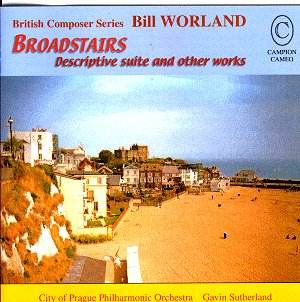Bill Worland belongs to the old school of "British
Light Music", of the variety that appeared, for instance, on Vernon
Handley's disc for Classic FM, rather than the more musically ambitious
offerings of composers such as Antony Hedges, David Lyon, and even the
current doyen of the genre, Philip Lane. So, it probably goes without
saying, that this disc, beautifully crafted as all its music is, will
only appeal to a certain audience and maybe a narrower one than that
which currently laps up the output of, for example, the ASV White Line
label (London Landmarks, Constant Lambert, Kenneth Leighton et
al).
Some of the pieces, even in the extended Broadstairs,
Descriptive Suite, sound like ballroom music, others like film soundtracks,
although there are moments of greater depth and feeling. The composer's
own highly informative booklet notes paint a vivid picture of the genesis
of each piece and lend a poignancy to Intermezzo 45 which the
music certainly lives up to. Worland describes his R&R at the end
of WWII, near Tel Aviv, following a time in the western desert. Even
so, the music is incredibly middle-of-the-road for most of its duration,
the closing Finale - Michaela (Reprise) proving the exception.
Rhapsodie Tristesse could almost be subtitled Rachmaninov-lite
(or Warsaw Concerto 1½, I suppose!). The pieces I ultimately
enjoyed most, alongside Intermezzo 45, were the closing two Americanisms.
Honky-Tonk Town was originally scored for banjo but as a jazz
combo piece is also very winning, whereas Midnight in Manhattan
is a spacious blues-style composition.
I haven't heard the equivalent Marco Polo Worland disc
but, whilst acknowledging that this isn't, in general, my particular
cup of tea, it is beautifully composed, lovingly recorded and may make
someone more nostalgic than myself for the times it evokes very happy
indeed.
Neil Horner


